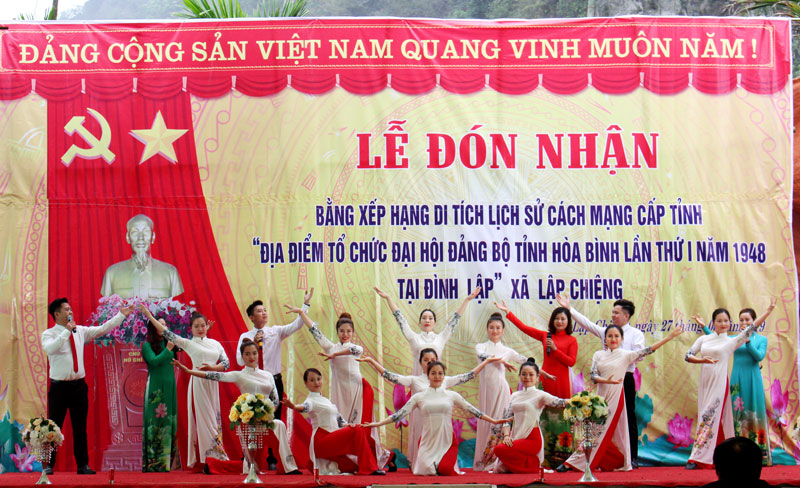
(HBO) – Lap communal house was previously located in Ha Bi commune, now Lap Chieng commune, Kim Boi district, Hoa Binh province. From May 21-25, 1948, the first congress of the provincial Party Committee took place there. This was an important historical and political event which marked the maturity of the provincial Party Committee in the resistance war against French colonialists.
 Art
performance celebrates recognition of Lap communal house as provincial
revolutionary historical relic site.
Art
performance celebrates recognition of Lap communal house as provincial
revolutionary historical relic site.
According to the elderly in the area, Lap
communal house was erected at the end of the 19th century. It was mainly made
of wood with one compartment and two lean-tos. There is an alter inside called
Cung So to worship the gods of the villages named "Ong Moi” and "Ba Nanh”.
People hold festival at the house on the eighth day of the first lunar month
annually.
With its historical and political significance,
Lap communal house was recognised as a provincial revolutionary historical
relic site on January 5, 2019, by the provincial People’s Committee. This is an
important legal foundation for the management, protection and promotion of the
house’s values in the short and long run. It is also an honour and pride of the
Party Committee, authorities and people of Kim Boi district./.
With an increasingly vibrant and widespread emulation movement aimed at building cultured residential areas and cultured families, Yen Thuy District has been making steady progress toward improving both the material and spiritual well-being of its people, while fostering a civilized, prosperous, beautiful, and progressive community.
Once lacking recreational spaces and community facilities, Residential Group 2 in Quynh Lam Ward (Hoa Binh City) has recently received attention for the construction of a new, spacious, and fully equipped cultural house. The project followed the model of state support combined with public contributions in both labor and funding.
The "All people unite to build cultural life" movement, which has been effectively integrated with Kim Boi district’s socio-economic development goals, is fostering a lively spirit of emulation across local residential areas, hamlets, villages, public agencies, and enterprises. In addition, through the initiative, traditional cultural values are being preserved and promoted, while community solidarity and mutual support in poverty reduction and economic development are being strengthened.
A working delegation of the Hoa Binh provincial People’s Committee led by its Permanent Vice Chairman Nguyen Van Toan on June 11 inspected the progress of a project to build the Mo Muong Cultural Heritage Conservation Space linked to tourism services in Hop Phong commune, Cao Phong district.
Born and growing in the heroic land of Muong Dong, Dinh Thi Kieu Dung, a resident in Bo town of Kim Boi district, in her childhood was nurtured by the sweet lullabies of her grandmother and mother. These melodies deeply imprinted on her soul, becoming an inseparable part of her love for her ethnic group's culture. For over 20 years, this love for her hometown has driven Dung to research, collect, and pass down the cultural values of the Muong people to future generations.
In the final days of May, the Ethnic Art Troupe of Hoa Binh Province organized performances to serve the people in remote, mountainous, and particularly disadvantaged areas within the province. These were not just ordinary artistic shows, but they were the meaningful journeys aimed at spreading cultural values, enhancing the spiritual life of the people and contributing to the preservation of ethnic minority cultural identities.



 Art
performance celebrates recognition of Lap communal house as provincial
revolutionary historical relic site.
Art
performance celebrates recognition of Lap communal house as provincial
revolutionary historical relic site.